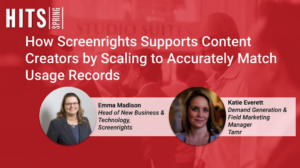Connections

How Tamr Helped Screenrights Support Content Creators Through Data Mastering With Machine Learning
Story Highlights
Screenrights, a company that manages royalty licensing for educational broadcast content in Australia and New Zealand, needed to find a better way to scale its efforts and accurately attribute usage records, and turned to Tamr, according to the two firms.
As the amount of educational video content grew significantly, the Screenrights team realized that manual record matching could no longer scale to address the millions of usage records across TV, mobile, IPTV and other over-the-air broadcasts.
 The company soon learned that machine learning-first data mastering was critical to achieving its goals of making sure content creators are paid and continue to make new educational videos.
The company soon learned that machine learning-first data mastering was critical to achieving its goals of making sure content creators are paid and continue to make new educational videos.
Speaking during the Workflow & Engagement Innovation breakout presentation “How Screenrights Supports Content Creators by Scaling to Accurately Match Usage Records” May 12 at the annual Hollywood Innovation and Transformation Summit (HITS) Spring event, Katie Everett, field marketing manager at Tamr, noted that, “like pretty much all industries, data plays a key role in the media and entertainment space.”
Data plays a significant role in “business decisions like selecting actors to star in movies, matching supplier data within procurement departments, understanding customer information, mastering content titles – data plays a role in it all,” she said.
Emma Madison, head of new business and technology at Screenrights, is “spearheading” technical projects at her company “from their IT roots to business case, navigating each step, with the end result of providing better and accurate data,” Everett pointed out, while introducing Madison.
“Screenrights is a collecting society, so we pay royalties to film and TV companies around the world,” including many members in the U.S., according to Madison.
“We sit at the… end of an ecosystem that doesn’t yet carry an identifier all the way through that ecosystem… that we could leverage to help match the royalties that we have to pay to the programs and the shows that our members have told us they’re entitled to claim royalties” for, Madison explained.
With Tamr, Screenrights is working on a large project using machine learning to help identify where there is a match between the money it has to pay and the rights that have been expressed in terms of who can claim what money, Madison said.
“It’s a growing challenge,” Madison told viewers, noting: “We’re seeing data volumes increase about 100 percent year on year, accelerated by COVID.”
 And if you are “not already feeling overwhelmed by the volumes of data, then it’s only inevitable that you will very, very soon,” she warned, pointing out that applies not only to large companies with huge networks but also to smaller companies because the “volume of data and the scale at which it grows” keeps growing “regardless of whether or not you’re small or you’re large,” Madison explained.
And if you are “not already feeling overwhelmed by the volumes of data, then it’s only inevitable that you will very, very soon,” she warned, pointing out that applies not only to large companies with huge networks but also to smaller companies because the “volume of data and the scale at which it grows” keeps growing “regardless of whether or not you’re small or you’re large,” Madison explained.
“In terms of being able to manage that data, what we see certainly with the companies that we deal with as our members, is that” the job of media and entertainment companies is to “make content and get it out there,” Madison noted. In the process, data may be treated as a “secondary” sort of thing – “but it will overwhelm you very fast if you don’t think about it now,” she warned.
Pointing to another HITS session with the Entertainment ID Registry (EIDR) and Meta Data Systems in which those organizations explained how they are embedding an identifier across as many platforms and systems as possible, Madison noted that is “crucial.” That is because “efficient and cost-effective rights and royalty management is all driven off the basis of standards and having numbers like EIDR… is crucial for that,” she explained, adding the “benefit” of doing that is “for everybody.”
Everett asked Madison to name the top three things a company can do to carry out a data initiative.
“The number one thing that you’ve got to get right at the beginning is a really solid understanding of the actual problem that you’re trying to solve – and stick with one problem that you’re trying to solve to start with,” said Madison.
Second, what is also needed is “buy-in for the need and the urgency from within the business because they’re the people who are going to carry out the execution of the project – and if they don’t understand why it’s needed now, it’s very quick for project risks in terms of scheduling to go off track,” she explained.
Third, “if you don’t have buy-in from the top, there’s also a good chance that your project will go off track because it’s all about resourcing and you need to be able to get resources committed to a project to see it through,” she said.
It is also important to make sure “you’re working with people who have a really, really good understanding of the data itself,” she added.
 “The benefit of using something like” Tamr’s solution is that it “integrates both supervised and unsupervised machine learning and also a human-guided approach, and it’s the human-guided approach that allows the people that are very familiar with the data to be the expert advisors along the way,” Madison said. Those experts may look at the results and say, “‘Hang on. There’s something weird going on here’” – and they must be able to figure out why that happened, she explained.
“The benefit of using something like” Tamr’s solution is that it “integrates both supervised and unsupervised machine learning and also a human-guided approach, and it’s the human-guided approach that allows the people that are very familiar with the data to be the expert advisors along the way,” Madison said. Those experts may look at the results and say, “‘Hang on. There’s something weird going on here’” – and they must be able to figure out why that happened, she explained.
Asked what her favorite part of the job is, Madison responded: “What really drives me is how do we make and do things better, so I like challenges where there’s a clear problem, where there’s an opportunity to do something better – and it doesn’t really matter what form it takes – but we are able to chip away at something, rearchitect something, make something faster.”
To view the entire presentation, click here.
HITS Spring was presented by IBM Security with sponsorship by Genpact, Irdeto, Tata Consultancy Services, Convergent Risks, Equinix, MicroStrategy, Microsoft Azure, Richey May Technology Solutions, Tamr, Whip Media, Eluvio, 5th Kind, LucidLink, Salesforce, Signiant, Zendesk, EIDR, PacketFabric and the Trusted Partner Network.









